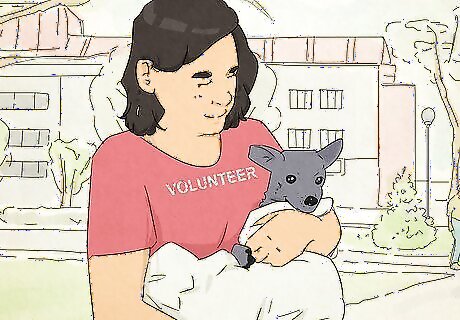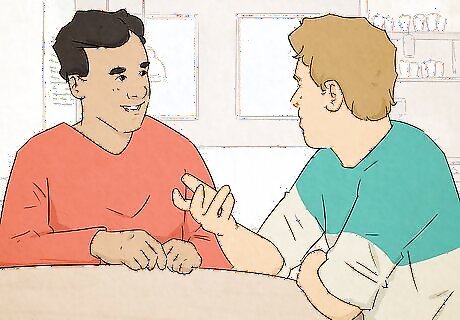
views
X
Expert Source
Jennifer Butler, MSWLife Coach
Expert Interview. 31 July 2020.
Transferring Skills in the Job Market

Inquire about work at your local job services center. Most of these places offer resume services for free, in addition to job placement information and opportunities. Jobs services centers can also help you file for unemployment, if you choose to do so. Do this immediately after you lose your job, in order to take advantage of job coaching. To find a jobs services center in your area, search for “jobs services office near me.”

Fill in gaps in your professional training through educational opportunities. Training yourself while you’re unemployed is a great use of time and will increase your likelihood of finding a new job. This is a great time to get certificates or to increase your computer knowledge. Contact your local Lifelong Learning Center, Job Services department, or community college and sign up for classes that will make you more qualified with the tools you work with. For example, if you worked as an educator but received most of your training through on-the-job learning, take a few education courses to learn some new pedagogy. This can help you see your unemployment as a time of growth rather than simply a liability.

Find a new job that correlates with your skills through online job sites. Don’t assume you need to do the same job as the position you lost. If you lost your job because it was obsolete, it will be very hard to find the same job again. If you’re unlikely to find new employment in your old field, look for a new type of job. Look on websites like Monster, LinkedIn, or Indeed, and search for jobs that differ from your previous work. Think of ways in which you can apply skills you already have to a new line of work. For example, if you worked in a factory, your job may have been taken over by an automated machine. But, if you gained administrative skills at your factory job, you could find a way to channel those into a job in a new field.

Volunteer to build skills and contacts that make you more employable. The best volunteer positions for your resume are those that allow you to get out and make contacts in the community. Volunteer positions within your community will look good on your resume and sound good in an interview. To find volunteer opportunities, reach out directly to organizations that you’d like to work with. Or search online for “volunteer opportunities near me.” For example, if you’d like to work in a veterinary field, volunteer at a local animal shelter. Or, if you’re an educator, ask if you can volunteer at your local high school or community college. It is good to stay busy, but too much unpaid work can take away from valuable job-seeking time.

Look into a disability-services program in your area if you are disabled. If you are unemployed and have health issues or a disability, a local disability-services program can help you receive vocational rehabilitation. You may qualify to undergo retraining for a new career free of charge. There are also plenty of online resources designed to help people with disabilities find employment. Check out the U.S. Government’s disability employment homepage at https://www.dol.gov/odep/topics/disability.htm.
Coping with Emotional Consequences of Unemployment

Take time to process the negative feelings that accompany job loss. When you lose your job—whether you were fired, laid off, quit, or the company itself went under—it’s normal to experience a range of negative emotions. These can include shame and grief, frustration, and anger. Don’t try to repress these feelings or push them away. Instead, feel the feelings, and acknowledge to yourself the negative emotions that you’re going through. Understand that these feelings are normal and healthy to experience in this setting and will pass with time. If you’re having a tough time coping with these feelings, or worry that you may be slipping into depression, you may need to reach out and find a therapist.

Manage your stress through expressing your feelings and exercising. Losing a job and being unemployed are tremendously stressful situations. Decrease the amount of stress you’re under by writing down your feelings, whether in a diary, a list of thoughts and feelings, or even a poem or 2. Getting these difficult emotions out on paper will give you relief from the stress. Physical activity is also a great stress-relief activity. Try to exercise for 30 minutes a day. You can do activities like jogging, running, walking, swimming, dancing, weight training, or martial arts.

Build a support network of friends and family members. Sharing your feelings and concerns with friends and family is a good emotional decision after losing a job. Unemployment often leads to insecurity and depression. Ask for support during this difficult time. For example, ask a friend if they would be willing to socialize on a weekly basis so that you don’t feel socially isolated. Or, talk about your unemployment-related feelings with a family member, so they can help you work through and process the frustrations.

Keep yourself busy by looking for work online and in person. When you’re unemployed, it’s important to fill your time and keep yourself busy. Do this by looking for jobs through online job sites, beginning with LinkedIn and Monster. You can also look through print job listings in local newspapers. In fact, it may be most helpful to think of searching for jobs as your full-time job. If you allow yourself to do nothing while unemployed, your prospects for finding a new job will worsen. At the same time, it’s important to still have fun and enjoy your life. So, if you’re looking for jobs, applying, and interviewing from 9 to 5 every day, make sure to do something you enjoy in the evening. Keeping yourself busy will also prevent you from feeling sorry for yourself or giving up the job search in despair.
Networking to Find New Job Opportunities

Ask locally employed friends if they know of employers offering jobs. Many people learn about jobs through their social network. So, take advantage of this fact by reaching out to employed friends and seeing if they have any potential leads for you to look into. Friends and even family members should be willing to help when you ask for their help. Say something like, “Are you still working for that publishing house? I’ve been having a little trouble getting back on my feet after I lost my job. Is there any chance you’re hiring, or could put in a good word with the boss on my behalf?”

Join a local business group or job club to find out about new jobs. Most towns have locally-focused business networks, sustainable business networks, or Chamber of Commerce groups. Get involved so that you can meet the people supplying the jobs. These groups or clubs will regularly provide information regarding local job availability and may assist with readying your resume. Local churches or other religious hubs often host business groups as well.

Visit job fairs to connect with potential future employers. Brush up your resume, put on a suit, and market your experience and qualifications at these fairs. If the job fair offers an online resume-submission option, consider this as well. Also, depending on the types of business groups that meet in your community, you could also ask for an invitation to a local Rotary Club or Chamber of Commerce group. Also, if you know friends who attend cocktail hours with clients or work colleagues, you could ask to join. This is a perfect time to meet new people and get your name out in the community.

Keep in contact with your former colleagues and bosses. They may be willing to share knowledge about company job openings before they are publicly posted. As long as you left the company on good terms, you can view the people there as networking partners. This doesn’t necessarily mean that you can get your old job back, but you can at least ask former supervisors or coworkers if they know of any openings in general. However, if you left the company on bad terms, it may not be wise to reach out to former coworkers and ask about new job opportunities.




















Comments
0 comment